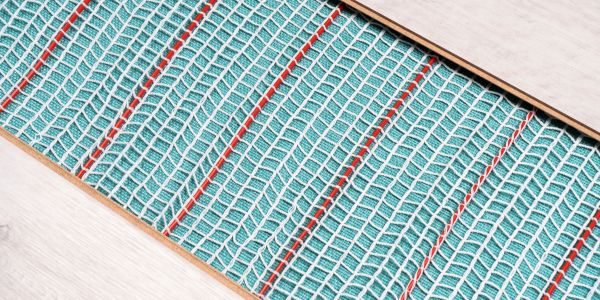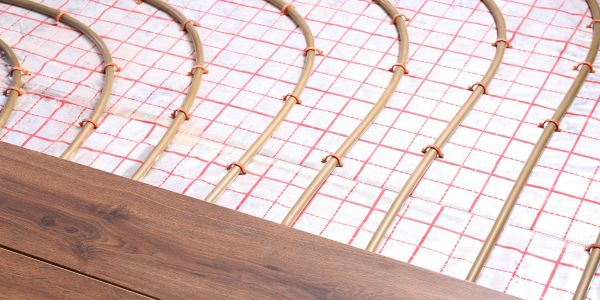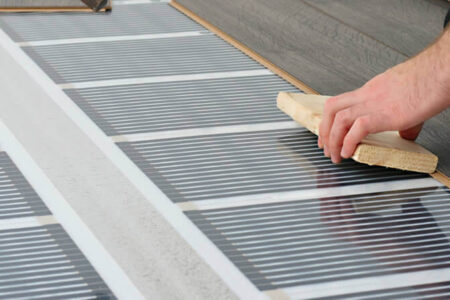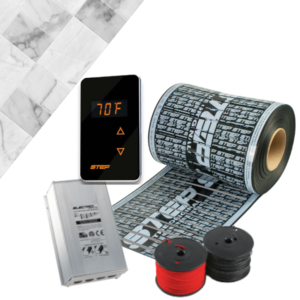Ensure it’s clean, dry, and level.
Reach out for efficient, cost-saving, and luxury laminate floor heating.


With decades of hands-on experience, we've honed our craft to become leaders in the heated floor industry. Trust in our expertise to deliver solutions that truly stand the test of time.

For our heated floors, we carefully select and offer only the best products. With GWD you're investing in durability, efficiency, and cutting-edge technology.

We're committed to providing top-tier heated floor solutions at prices that are competitive and fair. No compromises, just the best value for our valued clients.

Our team of highly skilled installers ensures that your heated floor system is set up seamlessly, with precision and care. Experience excellence from the ground up with our expert installation crew.
Delving into the world of radiant underfloor heating, there are two primary contenders: electric and hydronic systems. Both come with their unique set of benefits and challenges, ranging from installation complexities to maintenance needs.

Electric Radiant Underfloor Heating systems utilize electric resistance cables or mats to produce heat.The electric cables or mats are spread out and fixed across the floor, and once activated, they directly heat the floor surface above. Electric systems are inherently more reliable than hydronic systems as they have no mechanical or moving parts that could break down. The installation process is also much quicker and simpler, and there is no required maintenance.

Hydronic systems use a series of tubes laid beneath the floor into which warm water from a boiler circulates, producing radiant heat. They are typically more complex and expensive to install compared to electric systems and have a much higher likelihood of breaking down and need of repair. Hydronic systems also require regular maintenance unlike their electric counterparts.
Laminate flooring offers a blend of style and practicality to a home. Whether you’re introducing it to a new space or considering it for a replacement, it’s vital to understand the expenses involved.
| Laminate Flooring | $3-10/ft² |
|---|---|
| Plus | |
| System Cost | $14/ft² |
| Plus | |
| Installation Cost | $8-20/ft² |
| Plus | |
| Subflooring Replacement Costs | $3-10/ft² |
| Plus | |
| Underlayment Costs | $0.50-4.50/ft² |
| Total | |
| Low End Estimate | $28.50/ft² |
| Upper End Estimate | $58.50/ft² |
Same as New Build
Plus
Removal of Old Flooring = $1.50-3.50/ft²
Same as New Build
* Retrofitting entails placing the heating component between the floor joists from underneath the room. This method doesn’t necessitate changing the completed floor; however, it does demand access from an open ceiling below the room. If there’s an existing finished ceiling, like drywall or plaster, it will have to be taken down to access the joists.
Heated laminate floors elevate any room’s comfort. Ensuring a proper installation is pivotal for lasting warmth and durability.
Ensure it’s clean, dry, and level.
Decide on the layout and spacing.
Prevent heat loss and direct warmth upwards.
Follow the planned layout.
Ensure a safe electrical connection.
Adhering to manufacturer’s guidelines.
Re-test the system post-installation.
Yes. Laminate flooring is a popular choice for homeowners due to its attractive appearance and durability. When it comes to adding warmth, underfloor heating can be an excellent companion to laminate.




Certainly. Our heated floor mats are crafted to fit beneath laminate and various other flooring types.Our heating mats are self-regulating, preventing any chance of overheating assuring the floor’s quality is maintained.
No. Underlay isn’t mandatory for our radiant heat mats unless specified by the floor maker. Nowadays numerous laminate flooring planks come with an attached underlayment for added cushion or to manage slight subfloor irregularities.
No. Our radiant heat mats are perfectly compatible with laminate flooring.
When well-insulated, the material’s thickness above the heating mats primarily influences the thermostat’s response time. Thanks to appropriate insulation, the heat transfer remains unaffected since radiant heat moves upwards, ensuring no heat gets trapped or wasted below the in-floor heating mats.
Tile and Stone are generally held to be the best flooring to use with underfloor heating. These materials have high thermal conductivity, making them the most efficient for transferring heat. Ceramic, porcelain, and stone tiles are durable and store heat well. Next best are engineered wood, laminate and then vinyl.
The only other additional cost you are likely to encounter when installing radiant heated floor systems is for floor insulation. This can be required for retrofits, remodels or new build projects but only in certain scenarios, such as rooms that are located above an unheated room or rooms that are on concrete slabs.